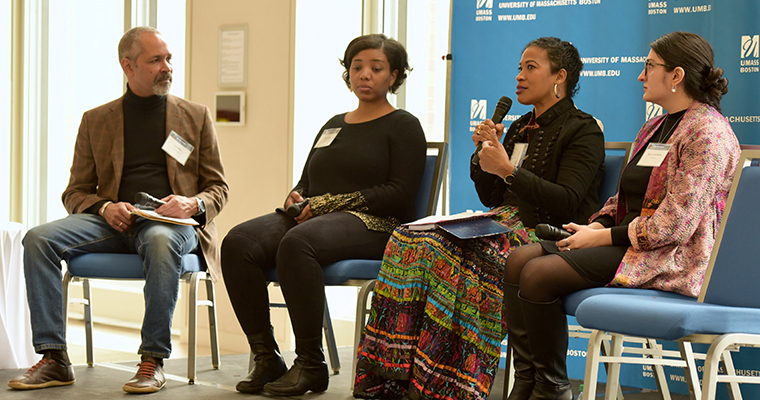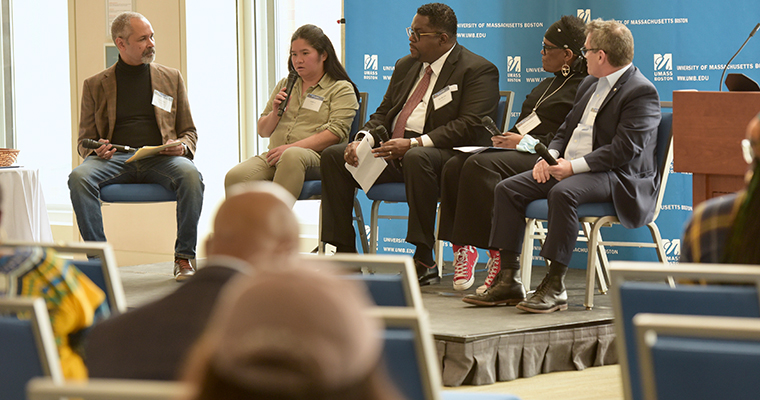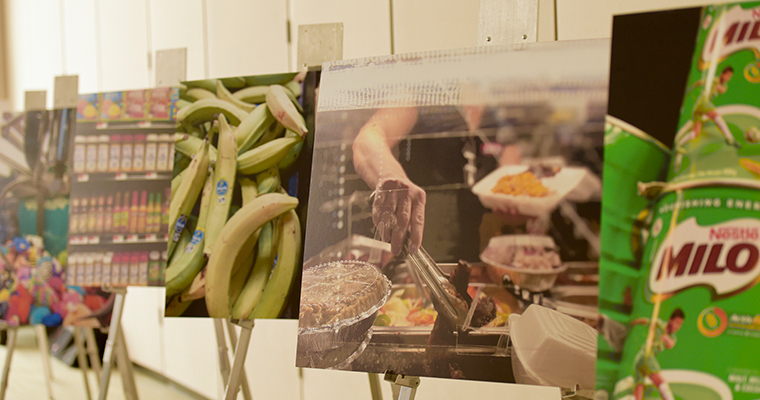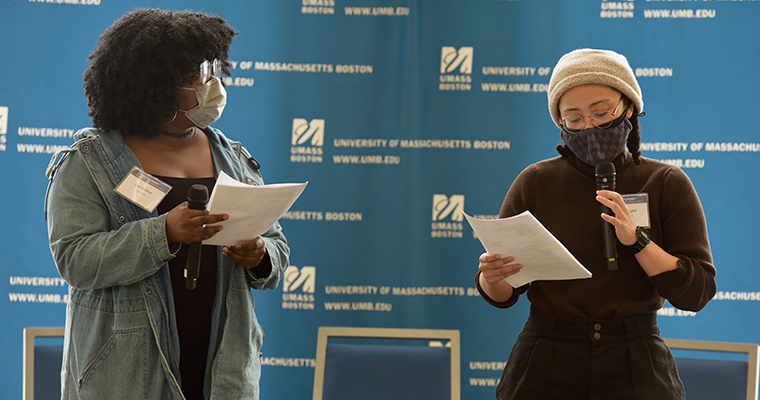UMass Boston Professors, Students, and Dorchester Community Leaders Discuss Place-Based Justice
Office of Community Partnerships Hosts Fifth Annual Fireside Chat

“ We have much work to do. We have much to learn from each other. ”
UMass Boston’s Office of Community Partnerships hosted its fifth annual fireside chat on February 24, bringing students, faculty, and community activists and leaders together to discuss this year’s area of focus, titled Our Dorchester: A Home for Place-Based Justice Partnerships. Panelists explored ways in which the university can deepen its close community connections and expand its service to the communities it touches, relationships it has fostered since its founding in 1964.
“In a city that has more universities and university students than any other city in the country, we have a special place as Boston’s only public research university,” said Provost and Vice Chancellor for Academic Affairs Joseph Berger in opening remarks. “I’m proud to be at UMass Boston because we are so embedded in the fabrics of the very communities where we are located and that we have responsibilities to serve. That being said, we have no laurels to rest on. We have much work to do. We have much to learn from each other.”
Cedric Woods, director of the Institute for New England Native American Studies, set the stage for the place-based discussion in reminding the audience of the history of European people settling in the Dorchester area and the displacement and atrocities inflicted on native peoples.
“Massachusett people’s … homeland is this place on which we stand and in which we are all guests, whether we acknowledge and live up to that responsibility or not. We are all guests here of the Massachusett people still and they still are with us today,” he said. “It’s not just a story of the past but also of the present and the future.”
The two panel discussions brought forward a number of ideas, but also developed themes around how the university can work to enhance engagement and opportunity in the neighborhoods it serves.
“Our mission is to be community engaged,” said Ping-Ann Addo, an associate professor of anthropology who focuses on the areas of cultural preservation and representation. “That can’t just be at the door of the university, at the border; it has to be in our teaching and in our research …and it has to be done in true collaboration.”
Some panel members emphasized the roles of UMass Boston’s centers and institutes as primary points of collaboration and community connections, and essential for moving forward. Lisette Le, executive director of the Vietnamese American Initiative for Development (VietAID) in Fields Corner, spoke to the importance of UMass Boston’s ethnic centers and institutes as a lifeline for the work she does.
“When I look for data … in order for us to make a case for the Vietnamese community, which is often left out of most conversations, I will go to the Institute for Asian American Studies,” she said, pointing out that their research provides invaluable data about community development, mental health, and other areas.
Le also pointed to the need of expanded ESOL programs in her community to help provide access to jobs in the booming construction industry in Dorchester and Boston at large, citing a language barrier as the single biggest impediment for Vietnamese construction workers.

Other panelists stressed the need for the university to provide campus access to community members and youths, and also pointed to the role of UMass Boston in creating economic opportunity in the communities it serves.
“I believe that UMass has an opportunity for the future to really be a place where the students that come in the front door, when they leave the back door, they should all have jobs,” City Councilor Frank Baker said. “I think that UMass has to be that place.”
Carney Hospital President and UMass Boston alum Stan McLaren, citing his personal experience, also stressed the need to grow and enhance the pipeline of educated, trained health care workers from UMass Boston’s diverse student population to help deliver care in a culturally sensitive manner. The issue is now more important than ever with the number of people leaving health care because of burnout, retirement, or other reasons, he said.
“The education I got at UMass actually started my path, and I’ll tell you where that path began,” McLaren said. “It began in a triple decker with a family of seven in a two-bedroom on Capen Street in Dorchester, ending up being the president of a hospital that was a mile away. And from that standpoint as a little black boy, that was a light year away. There was no way I saw that coming at all.”
He encouraged UMass Boston to continue to reach out to communities and particularly young people and public school students to expose them to the opportunities that are open to them to find economic and personal success, much like he did.
Other panel members included UMass Boston community development student Shamia Hicks, public policy doctoral student Bianca Ortiz-Wythe, Boys and Girls Clubs of Dorchester Vice President Queenie Santos, and moderator Yawu Miller, senior editor of the Bay State Banner.

The event included a photo exhibit entitled Our Dorchester Photography Project, shot by students Dacey Jackson, Layanie Oscar, and Slandy Sanon. Office of Community Partnerships Director Cynthia Orellana also gave a special thanks to the UMass Boston Jazz Quartet—students Annalee Clough, Deniece Woodard, Phillip Lei, and Matthew J. Villacis—and spoken word artists, students Celine Voyard and Layanie Oscar, for their performances.

In her closing remarks, Orellana urged attendees to continue to give thought to the places we occupy and move closer to “humanizing the people, places, and things that make Dorchester, Dorchester.”
“I hope this conversation is the first of many where we check our pulse, so to speak, on our place-based justice—or injustices—and make room for possibilities for growth, away from unintended harms, and toward what sets us closer to being a beloved community,” she said.